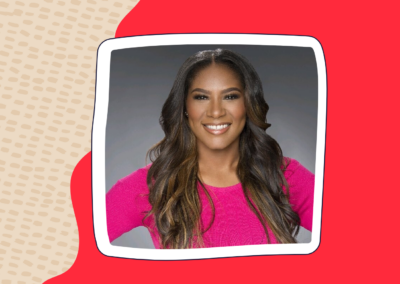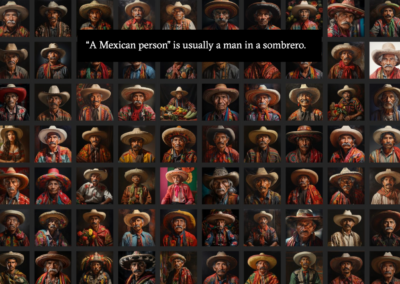Corporate America can be a scary place. It’s full of unspoken (and spoken) rules, hierarchies, and learning curves. In our lifetimes, we’ll spend an average of one-third of our lives at work—that’s an awful lot of time to be scared.
One-third of a lifetime spent working is a major amount of time for anyone, but it’s especially exhausting for people who can’t fully be themselves at work. Sadly, this is the case for many people of color. Specifically women of color. More specifically, Black women.
In our experience, work tends to be a place to leave ourselves behind and assimilate to new norms. Norms that force us to champion diversity initiatives, fit into cultures that bewilder us, and ultimately, slip into shiny new personas for eight (or more) hours each day. I’ve been there and it’s draining. It’s one of the reasons Black women hesitate to return to the office at a much higher rate than their peers. It’s why I was so ready to embrace freelance work.
After working for myself as a freelance writer for some time, my relationship with work has drastically changed. Foregoing the traditional structure of corporate work allows me more than just a flexible schedule: it empowers me to align how I work with who I am.
Unsurprisingly, I’m not alone—Black women in America are increasingly leaving corporate jobs to do their own thing.
To better understand the motivation behind the pursuit of self-employment, I spoke with three other Black women who, like me, left their 9-to-5s behind. What possibilities do we invent when we leave the corporate world? More than that—what can corporate America learn from our experiences?
We need real inclusion, not ‘culture fit’
Alignment between work and self is especially important for Black women, who often feel alienated by their work environments. In environments where we see little representation, it’s hard to feel embraced for who we are. But in environments where we control the narrative, everything changes. Around 39% of Americans worked freelance in recent years, and that’s not a coincidence. The beauty of freelance work is that it allows folks to fully bring themselves to what they do.
In 2020, Courtney Metcalf left corporate behind to bring her passion project to life. Four years later, Essence Socials and Branding is a marketing company fueled by her individuality. She says it was about planning first and leaping next. “I was mindful about leaving my job but ultimately, I was tired of overdoing it to fit in.” Ultimately, the pressure of work culture pushed her to make a choice. “Weirdly, I didn’t find myself code-switching with clients—it was co-workers that I had to fit in with,” she explains. “Clients seemed to understand who I was, but company culture created a sort of cliquishness that was exhausting.”
When culture isn’t designed for the inclusion of all people, it can be incredibly damaging. Often used to foster a sense of brand identity, culture can be easily weaponized against employees who aren’t able to “play the game.” This can be alienating for Black and Brown people, queer people, and other groups that have to fight for representation. Researchers are beginning to uncover the ways culture can function against Black people and finding that things like discouraging feedback, disregarding entry-level workers, and drawing attention away from social issues all have negative impacts.
Instead of looking at how well someone performs “culture,” encourage them to be authentic. Some folks don’t want to go to happy hour (Zoom or otherwise), and that shouldn’t count against them. Giving people the freedom to be themselves rather than encouraging them to “fit in” creates space for them to do their work unencumbered by the added—often exhausting—social pressure.
Your DEI strategy must have pathways to growth
Porsha Thomas is a founder, feminist food creator, and writer with over 16 years of experience developing marketing copy for corporate brands and startups. She left corporate after realizing that she’d been boxed into a role without the possibility of growth.
“I came in with a decade of marketing experience from freelance and agency work,” she says. “When internal marketing roles opened up, I was excited for the chance to transition out of my community-based role.”
Eventually, Porsha realized that leadership wasn’t open to the transition. “I applied repeatedly for the positions I wanted and was pacified with interviews that never amounted to anything.” Instead of hiring her for a role, they eventually offered her the “opportunity” to work alongside the marketing team…without compensation. “They told me I could run the Twitter account and be their point of contact for vendors,” Porsha shares. “Once leadership told me ‘people here grow horizontally, not vertically’—that was that.”
Regardless of intention, passing by Black workers for roles they’re qualified to do and passionate about is a mistake. Not to mention the fallacy of unpaid additional work (please, stop offering us extra-curricular projects—we need money). The higher up the ladder you go, the fewer Black people you’ll see: we make up just 5% of senior management and VP-level roles, 4% of SVP, and around 1% of Fortune 500 CEOs. This lack of representation signals a lack of value for our ideas, aspirations, and efforts. It’s why we feel unsupported and undervalued by our workplaces; Black employees are 41% less likely to view promotions in their workplace as fair, and 39% less likely to believe in their company’s diversity and inclusion efforts, compared to their white co-workers.
This is why supporting Black workers is paramount. Don’t just offer lunch-and-learns and leadership chats; provide clear pathways to leadership. Take Black folks seriously when they tell you they’re interested in an open role. Be transparent about exactly what they need to do and work with them to get there. These are the kinds of DEI efforts that actually make a difference.
Respect is allyship
While leaving corporate altogether can be one answer, finding a good balance between self-employment and “traditional” work can be another. Pasha Gray is a freelance editor who separates her time between personal projects and a full-time role with a major television network. She says that without her freelance experience, corporate work would be impossible.
“I’m a better advocate now because I’m not afraid to walk away if my needs aren’t met. Freelance work is a confidence boost because there is no hierarchy. There is no middleman—you have to learn how to get what you’re owed.”
Pasha’s unmatched confidence has boosted every aspect of her career. “People look at you differently when it’s your business. They ask questions instead of making demands; they consult with you and ask for advice. When you freelance, people come to you. You aren’t second-guessing everything you do because you already know they respect and value who you are.”
Allyship is more than just saying nice things, it’s about giving things to people who need them. Respect is one of those things. When respect is given, we don’t have to second guess our value. We don’t have to question our work or play unnecessary games. Respect is empowering because it creates agency—it shows someone how you value them from the very beginning. Respect is priceless, and Black people shouldn’t have to work two jobs to feel respected.
To foster respect in a corporate setting, inclusive language is key. Meet people where they are instead of expecting them to meet you where you are. Create clear policies to empower Black people and champion those policies. Listen to ideas and respond to them. It may sound time-consuming, but as a leader, it’s part of the job.
The best time for action is right now
Freelance work may be right for some, but those who remain in corporate positions urgently need safe, inclusive, respectful work environments. This extends to everything: salaries, flexible work policies, and benefits. If diversity and inclusion are truly the goal, believe Black people when they vocalize their needs. Listen to us, sit with our ideas, and ultimately, take action.



